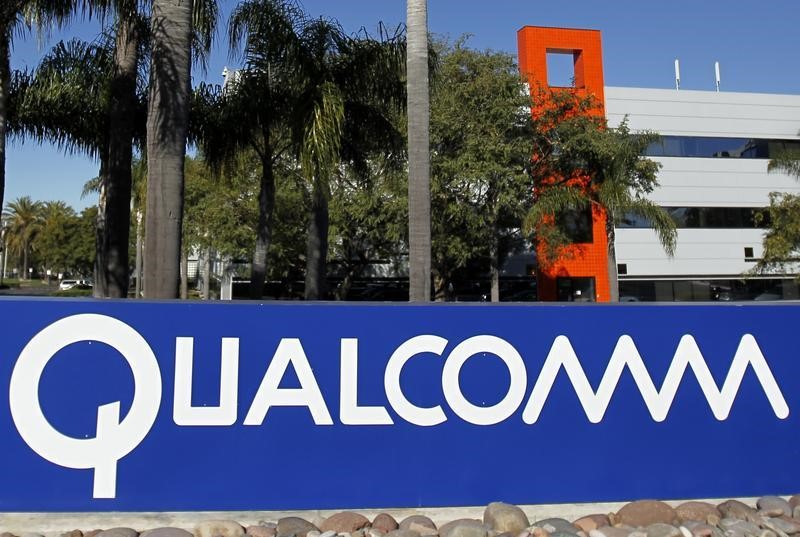Investing.com -- Chipmaker Qualcomm (NASDAQ:QCOM) said it feels “positive” about working with President-elect Donald Trump's administration, indicating it was not worried that proposed US tariffs on China would negatively affect its business there. China accounts for nearly half of Qualcomm's revenue.
Speaking at an investor event in New York, Qualcomm executives projected $22 billion in combined revenue over the next five years from laptops, automotive products, and other markets outside its traditional smartphone dominance, representing significant growth compared to its latest fiscal year.
Alex Rogers (NYSE:ROG), head of Qualcomm's technology licensing division, emphasized the company’s positive outlook on maintaining good relations with the incoming administration.
"We expect a good relationship going forward. We're very positive on the recent pick for Commerce Secretary, so we are expecting to have a good relationship and to be engaged as we have been through this past administration," Rogers said, referring to Howard Lutnick, Trump's expected nominee.
Addressing concerns about US-China trade tensions, Qualcomm CEO Cristiano Amon downplayed the potential impact of tariffs. China accounted for 46% of Qualcomm's nearly $40 billion in revenue during its most recent fiscal year, but Amon said he did not foresee challenges in maintaining business there.
"As geopolitics started to become front and center in the US-China conversation, the Qualcomm partnerships with China actually increased, as we expanded to other industries" beyond smartphones, Amon noted.
He added that previous tariffs on Chinese goods had not harmed Qualcomm and that Chinese companies are actively purchasing its automotive chips.
Qualcomm projects $8 billion in automotive chip revenue by fiscal 2029 and the Internet of Things (IoT) category is expected to provide an additional $14 billion.
Further, the company anticipates $2 billion in revenue from augmented and mixed-reality headsets, including those made by Meta Platforms (NASDAQ:META), which already use its chips.
Analysts comment on Qualcomm’s analyst day
Bernstein: “The company did not uptick their auto pipeline or targets (though it did sound like they do expect upside over time), and their Android outlook seems a bit unambitious given all their talk about edge AI potential. Nevertheless, the narrative of solid earnings power even ex-AAPL seems alive, and in general the assumptions don’t appear to require any huge stretches.”
Bank of America: “We walked away upbeat given Qualcomm’s strong market positioning and long-term revenue targets which suggest healthy growth potential across new segments. However, two questions remain: the timing of new segments ramping into revenue contribution, and the sustainability of near-term growth as recent strength has been mostly supported by one- time benefits. We maintain our Buy rating and are positive on Qualcomm’s longer-term positioning, noting that the path to achieving long term targets may not be smooth.”
Deutsche Bank (ETR:DBKGn): “We applaud QCOM’s diversification efforts, and believe the company is well positioned to deliver long-term growth outside of handsets (with Automotive targets seeming more realistic than IoT). However, we believe headwinds in the near/medium terms (Apple (NASDAQ:AAPL) share loss) will likely weigh on investors' willingness to reward the long-term diversification benefits until the net gains become more apparent.”
JPMorgan: “We expect focus from investors to be on: 1) upside and downside risks to the strong IOT targets after falling short relative to the prior outlined plan in 2021; and 2) the outlook for smartphone revenues in the intermediate term which could be a more near-term driver of the stock price, even though there remains a strong upside opportunity from a re-rating of the shares on achieving the planned diversification.”
Barclays (LON:BARC): "What will be picked at is IoT, where the CAGR is effectively flat since the last analyst day and the forecast is for >2.5x over the next 5 years. ARM penetration at 30-50% seems unlikely and the XR story has never been a reality. Net, the pivot away from handsets is expected but the 50/50 split leaves investors wondering if this is a handset downtick."
